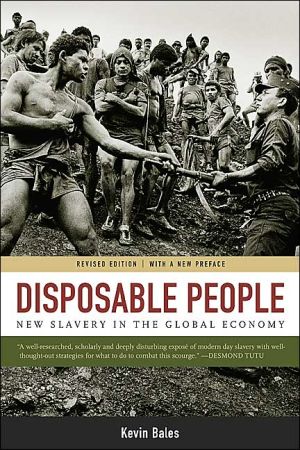Disposable People: New Slavery in the Global Economy
Kevin Bales's disturbing investigation of conditions in Thailand, Mauritania, Brazil, Pakistan, India, and parts of America and Europe reveals the nature of the new slavery and how it has adapted to the global economy. But one thing remains the same: violence. People are still taken by force and held against their wills through fear. Bales interviews actual slaves, slaveholders, and public officials to reveal the lives of slaves, including enslaved brickmakers in Pakistan, sex slaves in...
Search in google:
"A well-researched, scholarly, and deeply disturbing exposé of modern-day slavery with well-thought-out strategies for what to do to combat this scourge. None of us is allowed the luxury of imagined impotence. We can do something about it."—Desmond Tutu The Sunday Tribune Because of globalization, Bales argues, every consumer is linked to slavery and the final chapter explains practical ways of helping to bring it to an end. Begin by buying this book-all proceeds go to the international fight against slavery.
1The new slavery12Thailand : because she looks like a child343Mauritania : old times there are not forgotten804Brazil : life on the edge1215Pakistan : when is a slave not a slave?1496India : the ploughman's lunch1957What can be done232Coda : three things you can do to stop slavery263AppExcerpts from international conventions on slavery275
\ The Sunday TribuneBecause of globalization, Bales argues, every consumer is linked to slavery and the final chapter explains practical ways of helping to bring it to an end. Begin by buying this book-all proceeds go to the international fight against slavery.\ \ \ \ \ Times Literary SupplementA book replete with both fascinating reportage and acute analysis.\ \ \ Times Higher Education SupplementAt its best an empirically informed general discussion of slavery in the modern world economy.\ \ \ \ \ Silja TalviBales doesn't hesitate to use Disposable People to make an overt, immediate call for action. "If there is one fundamental violation of our humanity we cannot allow, it is slavery," he concludes. "What good is our economic and political power if we can't use it to free slaves? If we can't choose to stop slavery, how can we say that we are free?" \ —The Progressive\ \ \ \ \ Christian Science MonitorA gripping account if the major forms slavery takes around the world today, introducing enslaved people, their families, and entire social strata deprived of the most basic rights...Avoiding moralism and sensationalism alike, it discloses the daily soul-destroyingbrutality of slavery on out planet today.\ \ \ \ \ Kirkus ReviewsA numbing indictment of our blindness to the new forms of slavery engendered by the global economy. Bales, a leading authority on this subject (Univ. of Surrey, England), defines slavery, quite specifically, as the "total control of one person by another for the purpose of economic exploitation." The control is facilitated by violence and the foreclosure of personal freedom. He estimates, given this definition, that there are approximately 27 million slaves currently held in the world economy. One of the more virulent characteristics of this new slavery is a tendency to view slaves as relatively short-term investments—replacement is often cheaper than maintenance, thus the slaveholders will extract as much labor as possible, even if it means their victims will only last for several years of bondage. New slaveholders in the world economy also frequently insulate themselves against prosecution by maintaining fraudulent work contracts. Bales opens his essay with the story of Seba, a woman brought to France from Mali to serve as a house slave, but the book focuses primarily upon slavery in the third world. He describes the plight of child prostitutes in Thailand, slaves born under control of the White Moors in Mauritania, charcoal workers in Brazil, brick kiln operators in Pakistan, bonded farmers in India, and prisoners of war in Burma. He provides both personal accounts from the lives of individual slaves, and an overview of legal, political, and historical factors which influence the particular manifestation of slavery in a given locality. Bales makes a convincing argument that the new forms of slavery are directly related to trends in the global economy, and that opposition toslavery must also take the form of an international, global awareness of the situation. A powerful exposé of the dirty little secret of the global village. (12 b&w photos, not seen)\ \








